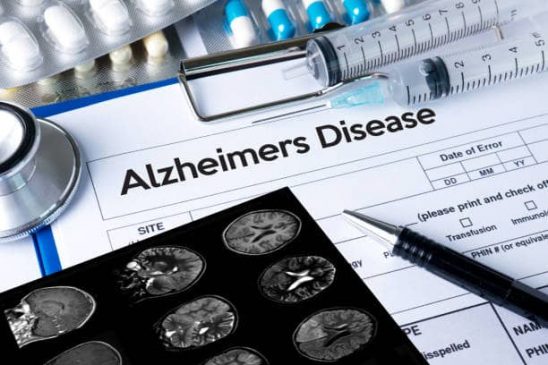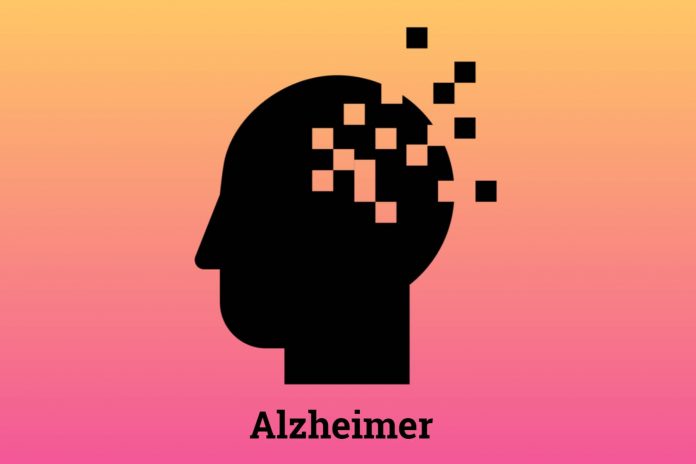What is Alzheimer’s Disease?
According to the Alzheimer’s Foundation of America, Alzheimer’s disease is a brain disorder that cripples the neurons or nerve cells, leaving the sufferer with short-term memory loss and the loss of certain brain functions. This generally results in a degeneration of reasoning and language skills. It can also result in changes in key personality traits and behaviors.

As more and more brain cells die, the victim’s social and behavioral skills decline. Currently, there is no known cure for this disease.
What Causes Alzheimer’s?
Current Alzheimer’s research indicates that several factors can lead to Alzheimer’s disease’s onset. Some of these factors have been narrowed down to age, damage to nerve cells due to oxidation by free radicals, environmental factors, head traumas and injuries, brain inflammation, and genetic factors. Of all these factors, age has been named the top risk factor for a person developing Alzheimer’s Disease. These factors, alone or in combination with each other, have been found to occur commonly among disease victims.
The Alzheimer’s Brain
Another common finding occurs after the suffering has passed away. Doctors are seeking to understand the effects of the disease on the brain have examined Alzheimer’s patients after death. Their findings conclude that sufferers of this disease have plague, shrinkage and a misshaping of the brain. Although they do not fully understand the process by which these commonalities occur, doctors have indicated that these common traits are implicit in causing the disease.
Shrinkage and the mishaping of the brain happens as a protein called tau builds into tangled masses in the brain. Plaques found upon autopsy are made of the beta-amyloid protein. This protein can interfere with communications between cells and is suspected of causing the death of brain cells.
Is Alzheimer’s Genetic?
Genetics is a factor because of the two different types of Alzheimer’s. Type one, known as sporadic Alzheimer’s, can be found in anyone. The second type of Alzheimer’s is FAD or Familial Alzheimer’s Disease. FAD has distinctive genetic patterns but is a rare form and only occurs in around ten per cent of sufferers. For those with a family history of FAD, the most at-risk ages are between 30 and 60.
FAD has been narrowed down to chromosomes 1, 21 and 14, where mutations in these chromosomes are common factors in Alzheimer’s sufferers. Scientists are also looking at mutations in chromosome 10 as a possible factor in the late onset of Alzheimer’s.
Other genetic factors include chromosome 19, where studies have indicated that the inheritance of a specific gene on chromosome 19 can increase the risk of developing FAD.
What is the Difference Between Dementia and Alzheimer’s?
Dementia is generally characterized by a sub-group of symptoms, such as the loss of higher function motor skills, the loss of memory, the loss of language skills and a variety of other functions. Dementia occurs when the nerve cells in the brain die or are permanently damaged.
Dementia is a common symptom in Alzheimer’s patients due to the progressive brain damage caused by the disease. It is also a common symptom of other diseases and disorders, including strokes, drug and alcohol abuse and traumas that result in a loss or blockage of blood flow to the brain.
The condition defines the difference between dementia and Alzheimer’s. Alzheimer’s is a specific disease that affects the body and brain of the patient in a patterned and predictable fashion. Dementia is a common term for a variety of symptoms that span several diseases and conditions. Dementia is more commonly known as a symptom of a disease rather than a disease.
Early Onset Alzheimer’s
In the early stages of Alzheimer’s, a person can notice forgetfulness or confusion that is not characteristic. These symptoms can progress. Sometimes, family members and friends see changes before the victim.
While anyone can have lapses in memory, such as forgetting where they put their grocery list, or car keys, memory loss due to Alzheimer’s is a progressive condition that worsens as time progresses. Alzheimer sufferers characteristically forget the names of their family members and close friends.
They also forget the names of common objects. They are known to put their possession in uncommon and hard-to-find places. They will also forget that they have had conversations or have asked questions or made statements, leading them to repeat themselves. Alzheimer’s patients will miss appointments and events routinely because they forget about them.
Confusion is also noted as an early symptom because of forgetfulness because sufferers have some difficulty finding the right words to express themselves. They can struggle with remembering the names of objects they see every day. Due to the forgetfulness and confusion, they can also find it extremely difficult to actively participate in the conversations around them, leaving them feeling isolated or separated from loved ones. The disorder is also caused when the disease makes it hard to think, reason and concentrate.
Symptoms of Advanced Alzheimer’s
The rate of deterioration amongst sufferers may vary. However, as the disease progresses, patients can lose the ability to read and write. They can also lose the ability to balance a checkbook, pay bills on time or even recognize numbers.
As time passes, patients will lose their ability to remember the day of the week or even the month of the year. They aren’t able to tell what season it is or remember recent life changes, such as a move to an assisted living facility. Alzheimer’s can also rob an individual of the ability to recognize their surroundings, making it extremely difficult to understand the setting he or she is in. This is responsible for patients becoming confused and scared in familiar settings.
Alzheimer patients should not be left alone as the disease progresses. Alzheimer’s will affect the patient’s ability to take care of himself or herself while impairing judgment and reasoning skills. Simple tasks like bathing or dressing can become difficult or impossible. More complex tasks, such as cooking or driving, may pose more of a challenge than the patient is prepared to meet. In advanced stages, most patients cannot tend to or care for themselves.
Those with advanced Alzheimer’s will also undergo behavioral and personality changes. This is due to the changes that occur in the brain as the disease progresses. With these changes, patients may experience mood swings and withdrawal from social situations. They can experience uncharacteristic anxiety, depression, a new mistrust of others, aggressive behavior and irritability. They can also experience delusions, such as a belief that their property has been stolen or that someone is trying to hurt them. Changes in behavior can also include wandering, changes in lifelong habits, including sleeping and a loss of inhibitions.
Advanced-stage Alzheimer’s patients will suffer the loss of learned skills. However, it is only in the advanced stages that these skills are no longer accessible. Once enjoyed past times, such as dancing, crafts, story-telling, reading, singing and enjoying favorite movies and music are lost, but only in advanced cases.
This is because it takes longer for the skills a person learned early in life to be lost due to how the brain changes in Alzheimer’s. It is suggested that those with these skills are encouraged to continue practicing them as long as possible to maintain a higher standard of living and experience success, even while dealing with the disease in other areas of life.
Alzheimer’s Prevention
As research into a cure for Alzheimer’s continues, people seek ways to prevent Alzheimer’s in themselves and their beloved family members. While there is no known cure for this disease, there is some hope in evidence suggesting a link between heart disease and Alzheimer’s disease.
Although there has been no definitive proof, experts have found that some common traits are shared between heart disease and Alzheimer’s disease. These factors include diabetes, high blood pressure, obesity and high blood cholesterol. These traits increase a person’s risk of heart disease and vascular dementia, seemingly leading to Alzheimer’s.
As a possible preventative measure, experts are suggesting a targeted approach. This approach is aimed at those that are most at risk for dementia. However, anyone can participate with a doctor’s approval.
The suggested approach for possibly preventing Alzheimer’s is to follow a program that keeps the participant physically, mentally and socially active on several levels. Participants are encouraged to engage in exercise and cognitive stimulation activities and remain socially active. Cognitive stimulation activities are group sessions in which participants are given mental stimulation exercises in a group setting. This helps with cognitive functions, as well as providing some social interaction. It has traditionally been used for those suffering from mild dementia. It also requires following a healthy diet.
Alzheimer’s Treatment
Alzheimer’s patients are treated with drugs and environmental controls to make them feel comfortable and safe. The drugs that have been developed for Alzheimer’s patients are Cholinesterase inhibitors and Memantine or Namenda. The list of Cholinesterase inhibitors includes Aricept, donepezil, Razadyne, galantamine and Exelon, or rivastigmine.
These are effective because they supplement a chemical in the brain that is responsible for communication between cells. For those these drugs work for, their symptoms are slower in progressing to moderate or severe Alzheimer’s. Unfortunately, these drugs work for less than half of the people that take them.
Memantine, or Namenda, works by slowing the advancement of the symptoms for those with moderate or advanced Alzheimer’s. It targets a different network of brain cells, aiding in their communications. It has been known to work in combination with one of the Cholinesterase inhibitor’s.
In addition to the drugs, Alzheimer’s sufferers need a stable home environment where they feel safe and secure. Due to the changes in the brain, patients can become extremely upset, aggressive or scared over seemingly small and unimportant occurances.
Caregivers and Alzheimer’s patients are encouraged to take certain steps to minimize the stress in their daily lives. These steps include keeping commonly used objects, such as mobile devices, wallets and keys, in the same place, keeping them from being lost. Families are also encouraged to reduce the number of mirrors in a home because Alzheimer’s sufferers find mirrors frightening and confusing.
Although there is no cure, Alzheimer’s can be managed and treated. The treatments and medicines can provide years with loved ones not previously available to families.
Also Read:















